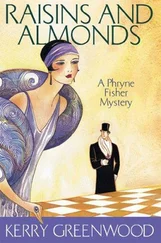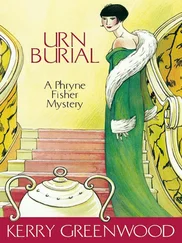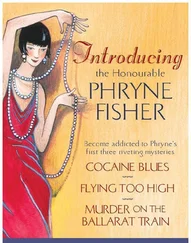Kerry Greenwood - Tamam Shud
Здесь есть возможность читать онлайн «Kerry Greenwood - Tamam Shud» весь текст электронной книги совершенно бесплатно (целиком полную версию без сокращений). В некоторых случаях можно слушать аудио, скачать через торрент в формате fb2 и присутствует краткое содержание. Город: Sydney, Год выпуска: 2012, ISBN: 2012, Издательство: NewSouth, Жанр: Детектив, Прочая документальная литература, на английском языке. Описание произведения, (предисловие) а так же отзывы посетителей доступны на портале библиотеки ЛибКат.
- Название:Tamam Shud
- Автор:
- Издательство:NewSouth
- Жанр:
- Год:2012
- Город:Sydney
- ISBN:978-1-742-23350-5
- Рейтинг книги:3 / 5. Голосов: 1
-
Избранное:Добавить в избранное
- Отзывы:
-
Ваша оценка:
- 60
- 1
- 2
- 3
- 4
- 5
Tamam Shud: краткое содержание, описание и аннотация
Предлагаем к чтению аннотацию, описание, краткое содержание или предисловие (зависит от того, что написал сам автор книги «Tamam Shud»). Если вы не нашли необходимую информацию о книге — напишите в комментариях, мы постараемся отыскать её.
Tamam Shud — читать онлайн бесплатно полную книгу (весь текст) целиком
Ниже представлен текст книги, разбитый по страницам. Система сохранения места последней прочитанной страницы, позволяет с удобством читать онлайн бесплатно книгу «Tamam Shud», без необходимости каждый раз заново искать на чём Вы остановились. Поставьте закладку, и сможете в любой момент перейти на страницу, на которой закончили чтение.
Интервал:
Закладка:
And in Adelaide, City of Churches, she had rediscovered sleep without dreams, and wine not bought with blood, and trains in which she could travel without having to worry about partisan bombs. She was still wealthy. Land in Australia had not lost its value. Taxation was still low. Rationing was avoidable. The house in St Kilda Road remained her principal place of residence. But Adelaide had become a holiday place for her, one with such deep immemorial peace as the grounds of Cambridge no longer held.
Therefore, she was very angry when she found a dead man on Somerton Beach.
Only one memory, of all the dreadful memories, still came between her and sleep. Not every night, but often enough to plague her, and to make her wonder if she was forever damaged. A young German, captured by the Maquis, refusing to reply to questions about troop movements and numbers. He had been very frightened; she had smelt his fear. He had cowered back into the wall of the ditch, his flesh shrinking from the idea of torture. And yet he had not spoken. Pale and smug in death as though proud that he had kept faith and honour intact, his white face haunted Phryne’s sleep and occasionally flashed in front of her waking eyes.
And here, as she walked up from the water to the steps that led to the road and her car, was the same face. He was older than the German soldier had been. She put his age at about her own: forty-eight. He was tall, well built and good-looking. His eyes were shut and he looked as though he was asleep, if one could ignore the slackness of the hands and the drooping of the head. She touched him. He was cold. And it was seven in the morning on 1 December 1948, and it was going to be a very hot day.
Surprising herself, she fought down a sob.
‘I’ve seen enough dead men in the last four years, why should this one affect me?’ She called herself roughly to order. That’s enough, Chatte Noire , up you go. Go to one of these nice houses and have the police called. It is nothing to do with you. This is not your dead man, Phryne!’
Almost against her will, she noticed that there were no marks in the sand around his feet. He was sitting on the bottom step, his feet on the beach. He looked as though he had felt unwell, sat down and died where he was. His clothing was all in order and there seemed to be no mark on him. Nice clothes, brown suit, topcoat, white shirt, his tie still in place and tied with a Windsor knot. Unmarked and quite dead. Yet there was that secret smile on his lips. She wondered what colour his eyes were.
Then she ran up the steps and knocked at one of the house doors, to tell the comatose inhabitants that there was a corpse on their nice clean beach.
‘Marie!’ Phryne called as she came into her small house on West Terrace. ‘Marie, p’tit, est-ce que tu dans le maison ?’
‘ Oui ,’ replied a light voice from upstairs. ‘ Bonjour , Madame.’
Marie had been acquired in Carcassone, a child of twelve orphaned by a shell and removed by Phryne from a nasty destination. She had resisted all attempts to send her away after the war, and no one could find any survivors from the Jewish colony in that city. So she had come to Australia with Phryne. She was small, dark and intense, and so pretty that Phryne did not expect to keep her long.
She came down the stairs and caught sight of Phryne’s face.
‘What has happened?’
‘I found a dead man on the beach. I have seen enough dead men but I never expected to find one here.’
‘Murdered?’
‘No, he appears to have just died.’
Marie saw that Phryne was more shaken than she was willing to admit. She ran down the stairs and took her arm.
‘Come. We shall have a tisane. With a little cognac’
Side by side in the hall mirror, Phryne saw the dark, glowing, flawless face of Marie and her own countenance. Middle-aged, she thought, surveying the corded throat and the streaks of grey in her hair. Her eyes looked back at her, still intensely green, but wary and dilated.
‘Yes, you’ve seen a thing or two,’ she said to her reflection. ‘All right, Marie, tea and brandy it is. I can’t absorb shocks like I used to.’
Marie considered that Phryne was clearly still very attractive and, in any case, the best-dressed woman she had ever seen. She paid no attention and hustled her into the kitchen.
Two men sat huddled over a formica table in the most depressing pub in Hindley Street. They were careful not to attract attention; so careful that the other drinkers had noticed the air of cold seclusion that surrounded them and had given them a wide berth, isolating their table in the middle of a pool of silence.
‘When does she leave?’ asked the smaller and darker man. His red-headed companion sighed and scrubbed at his jaw with a hand calloused like a bricklayer’s.
‘Evening.’
‘Waste a few words on me, Damien,’ begged the first. ‘Which evening, for the good God’s sake?’
‘Tomorrow evening,’ said Damien. ‘And do not go on about words, Brian. It is words which got us into this and words which always betray us.’
‘So it is,’ agreed the dark one, ‘so it is. Are you going, then?’ he added, as Damien stood up.
‘I am. You will be for Melbourne?’
‘The morning train, yes. No sign of the suitcase? He probably left it at the station.’
‘No sign. They will raid the station tonight. He may have left it in a locker.’
‘They are not going to like this, Damien.’
‘No, Brian. They are not going to like it.’
‘Likely I am going to my death, bringing them the news of our failure.’
‘Yes.’
‘God be with you, Damien.’
‘And with you, Brian.’
Phryne had absorbed her tea and brandy, and was having a bath when the policewoman arrived. She came out to speak to her dressed in a heavy silk gown which dated to the 1920s. Such fabric was not to be found in a postwar world, mused Woman Police Constable Hammond, sitting down, at Phryne’s invitation, on the couch. At least this lady, she realised with relief, was not going to have hysterics and cry on her uniformed shoulder. In fact, thought WPC Hammond, as the green eyes of the middle-aged lady met her own soft brown ones, this was a woman who knew a good deal more about death than she did, and was no longer startled by it.
‘Miss Fisher? Er… Lady Fisher?’
‘Just Miss Fisher. What’s your name? Nice to see women being given some position in the world at last. Constable, are you? Well, I hope they make you a sergeant. Would you like tea or coffee? And how can I help you?’
‘My name is Hammond, I would like some tea and I came about the dead man on Somerton Beach.’
‘Yes, I thought that it might be that. Marie, can you make some tea? It’s all right, this is Australia and she is a police officer.’ Phryne smiled at Hammond. ‘Marie has only met people in uniform in the war and they always wanted to send her to Ravensbruck. You’ll have to excuse her, Constable. Now, what about the man on Somerton Beach?’
‘What were you doing there, Miss Fisher, and where was he when you first saw him?’
Phryne began to explain, in a crisp, ordered narrative which WPC Hammond took down in her notebook. When Phryne had finished, the officer looked up and asked, ‘Miss Fisher, I’ll be frank with you. The bigwigs have been onto us when we made a routine check on you, as a witness. They say that you were in the Resistance during the war in France. I’m going to ask you this, even though my boss wouldn’t like it.’
‘Well, ask.’
‘Did you know the man? Did he have any connection with… with what you were doing during the War?’
Читать дальшеИнтервал:
Закладка:
Похожие книги на «Tamam Shud»
Представляем Вашему вниманию похожие книги на «Tamam Shud» списком для выбора. Мы отобрали схожую по названию и смыслу литературу в надежде предоставить читателям больше вариантов отыскать новые, интересные, ещё непрочитанные произведения.
Обсуждение, отзывы о книге «Tamam Shud» и просто собственные мнения читателей. Оставьте ваши комментарии, напишите, что Вы думаете о произведении, его смысле или главных героях. Укажите что конкретно понравилось, а что нет, и почему Вы так считаете.












